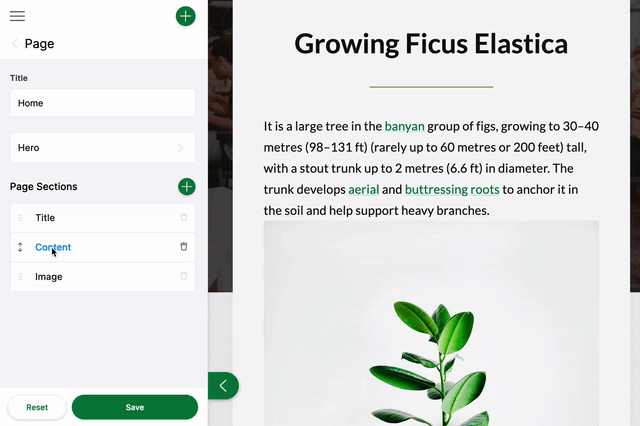Docs
v.Latest
Introduction
Core Concepts
Querying Content
Editing
Customizing Tina
Going To Production
Media
Drafts
Guides
Framework Guides
Migrating From Forestry
Further Reference
Schema
Search
Content API
Self-Hosted Components
Blocks Field
This content is out-dated for the latest versions of TinaCMS. See other docs pages for more up to date information about Blocks
This is an advanced-use feature, and likely not something you'll need to configure. What you probably want is the content types reference!
The Blocks field represents a list of items, similar to the Group List field, but allows each entity in the list to have a unique shape.
For an in-depth explanation of the Blocks field, read our "What are Blocks?" blog post. To see a real-world example of Blocks in use, check out the Tina Grande Starter.

In the gif above, you see a list of Blocks: Title, Image, and Content. The form for this field could be configured like this:
const PageForm = {label: 'Page',fields: [{label: 'Page Sections',name: 'rawJson.blocks',component: 'blocks',templates: {'title-block': TitleBlock,'image-block': ImageBlock,'content-block': ContentBlock,},},],}
/*** Block template definition for the content block**/export const ContentBlock = {label: 'Content',key: 'content-block',defaultItem: {content: '',},fields: [{ name: 'content', label: 'Content', component: 'textarea' }],}
The source data for the ContentBlock might look like the example below. When new blocks are added, additional JSON objects will be added to the blocks array:
{"blocks": [{"content": "**Billions upon billions** are creatures of the cosmos Orion's sword cosmic fugue at the edge of forever science?","_template": "content-block"}]}
Blocks Field Options
import { Field } from '@tinacms/core'interface BlocksConfig {name: stringcomponent: 'blocks'label?: stringdescription?: stringtemplates: {[key: string]: BlockTemplate}}
| Option | Description |
component | The name of the plugin component. Always 'blocks'. |
name | The path to some value in the data being edited. |
label | A human readable label for the field. Defaults to the name. (Optional) |
description | Description that expands on the purpose of the field or prompts a specific action. (Optional) |
templates | A list of Block templates that define the fields used in the Blocks. |
Block Template Options
interface BlockTemplate {label: stringkey: stringfields: Field[]defaultItem?: object | (() => object)itemProps?: (item: object) => {key?: stringlabel?: string}}
| Option | Description |
label | A human readable label for the Block. |
key | Should be unique to optimize the rendering of the list. |
fields | An array of fields that will render as a sub-menu for each group item. The fields should map to editable content. |
defaultItem | A function to provide the block with default data upon being created. (Optional) |
itemProps | A function that generates props for each group item. It takes the item as an argument. (Optional) It returns an object containing, key: This property is used to optimize the rendering of lists. If rendering is causing problems, use defaultItem to generate a new key, as is seen in this example. Feel free to reference the React documentation for more on keys and lists. label: A readable label for the new Block. |
This interfaces only shows the keys unique to the blocks field. Visit the Field Config docs for a complete list of options.
Table of Contents
© TinaCMS 2019–2025